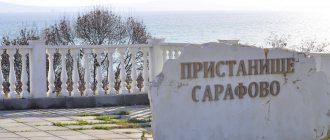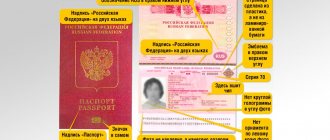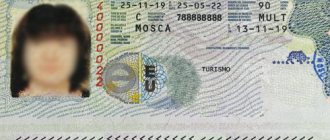Italy is an attractive country for emigration from Russia and the CIS. Pleasant subtropical Mediterranean climate, sunny weather, mentality suitable for the Slavs, normal attitude towards Russians, inexpensive life by the standards of Europe and even Moscow. The country is divided into 20 regions. Each of them has its own prices and living conditions. In the northern part of the country there are ski resorts of the Alps, in the southern part there are beaches, sunny weather with air temperatures up to 33°C and warm sea for 6 months a year. Precipitation is no more than 70 cm per year.
The main problems of Italy in 2021 for immigrants are unemployment, migrants from China, Albania, refugees from Syria, Iraq, Iran. They settle in isolated communities in cities and drive out local residents from entire areas (for example, big problems in Milan).
Number of migrants in Italian regions (2021 information)
In areas where there are many migrants, locals sell real estate at prices below market prices, which is what immigrants from Russia, Ukraine and other CIS countries fall for.
We will analyze in detail all aspects of life in Italy, tell you how immigration to Italy works and what to expect from this country.
How much money do you need to move to Italy?
Up to 10,000 euros . For students, young professionals, freelancers, couples in love who dream of life outside of Russia or want to live in Europe for two or three months. For this money you can test the waters for moving, but it will be difficult to gain a foothold in the country without a job with a regular income of 1,500 euros or more.
From 40,000 euros . For young people and married couples who are not yet planning children, but really want to live in Italy and obtain a residence permit. The main difference is that for 30,000 euros in Italy you can buy housing in the regions of Calabria and Puglia. There is enough money for a room, a one-room apartment in an old house and a poor area.
From 100,000 euros . For a family of 3 or 4 people who want to buy property and move to Italy to obtain a residence permit, and then permanent residence. With a budget of 100,000 euros, you can buy a good apartment or a 100 m2 house away from the tourist area and large cities, where real estate is cheaper.
From 500,000 euros . For wealthy people who want to wait for a residence permit in comfortable conditions. You also need to pay for the services of realtors, taxes, fees, charges, therefore, with a property value of 500,000 euros, you need more than 550,000 euros for a comfortable move.
Such a studio costs from 300 to 450 euros per month, depending on the region (in Milan such an apartment costs from 1000 euros per month)
These are approximate amounts, which are very conditional. Because a lot depends on your appetites and ability to save.
Reviews from Russians about life in Italy
How do Russians live in Italy? Judging by the reviews, life in Italy is not easy and cloudless for all Russians. Let's give a few of them as an example.
Almost everyone who left and lives there says that contact with Russia cannot be lost. No matter how well you speak the language, no matter how well you earn, you will always be an outsider, you will always stand out. Not always in a positive sense, etc. On the other hand, none of them are in a hurry to leave back, because, having become accustomed to the Italian way of life, to Italian beauties, food, they don’t really want to return to their Ulyanovsk, Nizhny Novgorod or even Moscow .
My opinion is that you need to get on your feet and earn money in Russia. And already having some passive income in Russia, even 700–1000 euros per month (whether it’s renting out an apartment or a bank deposit), in Italy you can already feel comfortable, not grab any low-skilled job, get an education, an MBA (in In Italy, many study until they are 35–40 years old!) and build a decent life. Among the stories when a person left everything and went to conquer Europe, there are more with a sad ending than with a happy one.
Katerina Danekina
I live in Taranto, a very southern city. During my entire stay there was NEVER a case of nationalism (can I say that?) addressed to me. Curiosity, interest, a lot of questions about our lives - yes. There are many stereotypes about Russia, but this is due to a lack of information.
Kate
When they talk about unemployment in Italy, it’s not for the sake of saying something nice. According to official data, the unemployment rate in Italy was 12% (for comparison, in Russia - 5.7%). But in practice, everything is much worse: the unemployment rate is growing rapidly, especially among young people. In Russia, if you wish, you can always find a position as a waiter or salesperson in a store. Let it be 10,000 rubles, but it’s possible. In Italy, about 100 applicants apply for a position as a salesperson or waiter for a salary of 500 euros. If it is not a tourist area, Italians are hired first.
Natalia Goberti
I have been living here for 3 years, and although Prato is in Tuscany, it is full of immigrants from the south... as well as Chinese, Arabs, African Americans, Romanians and Slavs... People have different attitudes and are mostly quite biased...
Kateryna
Which people will find it easier?
- Those who have passive income or remote earnings from 1500 euros . This could be a business, rental property, bank accounts, stocks, bonds or remote work.
- Those who know English or Italian . In large cities and tourist areas, many Italians speak English, but in the interior of the peninsula, not everyone understands English.
- Lean . You turn off the lights behind you, sleep easily in a cool place, pay attention to discounts, promotions and are ready to go to the store late at night to buy discounted products.
- Those who do not break rules, laws and value bureaucracy . The fine for feeding pigeons in Milan Square is 500 euros. If you bought a counterfeit product, you paid a fine from 1,000 to 10,000 euros. We pulled into the parking lot and didn’t turn off the engine – 400 euros. How do you like this economy? In Italy it is very expensive to break the laws, and the bureaucracy persecutes you at every turn. If a piece of paper is needed, then it must be there, otherwise there will be a fine and an agreement will not be possible in 98% of cases.
The path to a residence permit in Italy
To come to the country for 3 months or longer, you need to get a category D visa or apply for a Schengen visa. If you plan to obtain a permesso di soggiorno (residence permit), then apply for a category D visa. It is just for people who enter the country to obtain a residence permit, and then permanent residence in Italy.
You can obtain a residence permit in several ways:
- Business visa . It is almost a 100% option to obtain a residence permit for the majority of Russian citizens who are engaged in business or are ready to engage in it. First, you get a category D visa, then you open a company, register as an individual entrepreneur, become a self-employed professional (a valuable specialist working for yourself) or open a representative office of your company in Italy.
- Resident visa (“Golden Visa”) . 500,000 euros in startups or from 2,000,000 euros in securities for a period of 2 years or at least 1,000,000 euros in an Italian company for two years. Investments do not give the right to automatically obtain residence permit status for foreign citizens. The investor must apply for a resident visa (you renew the residence permit every year), then you can apply for permanent residence. A multiple visa allows you to travel without problems within the Schengen area.
- Employment (work visa) . Looking for a vacant position in Italian companies, submit your resume and undergo an interview. If the company is ready to take you on, it submits an application to the immigration department. The problem with this method is that in Italy there are quotas for migrant workers, of whom there are now a lot in the country, so going through an interview with a company does not mean getting a job and obtaining a residence permit.
- Registration of the chosen place of residence (VIP Premium Lounge VMS) . The point is that a non-resident of Italy applies for a VIP visa or VIP status, which provides for residence in Italy without the right to work, social and medical insurance. There are several conditions: no outstanding convictions, passive income and housing or rental agreement.
- Study visa, and then residence permit . Belongs to category D (for long-term residence) and is issued for 1 year. A visa can be obtained if you provide documents confirming your studies at a higher education institution, college or school. The student must confirm knowledge of English or Italian at a level not lower than upper-intermediate (English category B2) - this is the threshold advanced level of language proficiency. By the end of your studies you need to look for a job.
- Visa pending employment. This is usually a way to avoid deportation if you graduate from college, quit (get fired) from your job, or your business fails. You contact the employment center and receive a residence permit “pending employment” for a period of at least 12 months. During this time, you can again find a way to get a visa.
Other options: marriage, family reunification and refugee status. Refugee status is becoming increasingly difficult to obtain as the country is overwhelmed by the flow of migrants.
How to move to permanent residence
How to move for permanent residence to Crimea from Russia
To move to Italy for permanent residence from Russia, you must first obtain a residence permit, and then a temporary residence permit.
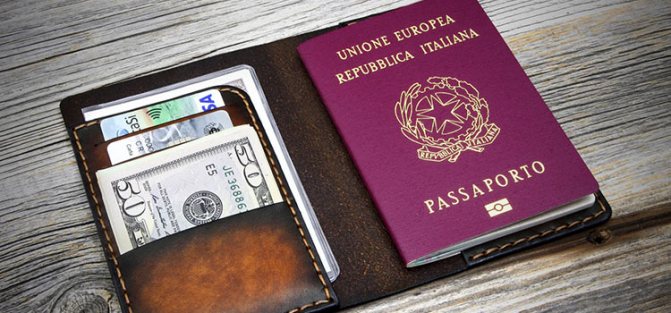
Italian passport
How to obtain a residence permit in Italy
First, you will have to collect a package of documents for a residence permit (Permesso di soggiorno), which will confirm not only the desire to leave, but also the financial capabilities of the applicant.
Basic documents for obtaining a residence permit:
- application form (questionnaire);
- photo cards;
- applicant's passport;
- certificate of no problems with the law;
- income documents (for example, a bank statement);
- real estate agreements (rent or purchase of housing in Italy).
Important! The list of papers depends on what category of residence permit is required. If relatives are reunited, then you will need to prove the degree of relationship (for example, if you are waiting for a husband and wife - a marriage certificate), you plan to work in Italy - present a contract with an Italian company and a work permit.
The package of papers is submitted to the Italian consulate at the place of residence. If emigration to Italy has already taken place, then you can submit documents through the immigration office, post office, or municipal administration of the area where you plan to live.
The residence permit is obtained for a period of 1 year (in most cases), and then is renewed every year until the expiration of the required naturalization period.
Obtaining a long-term residence permit (long-term residence permit)
After 5 years, you can apply for a long-term residence permit (Permesso di soggiorno UE per soggiornanti di lungo period). This is what is often called the “permanent residence document,” although this is a very conventional name.
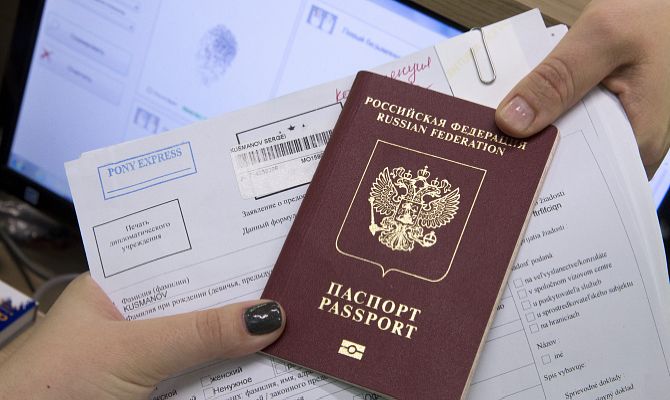
Permanent residence requires the preparation of a package of documents
Basic documents that will be needed:
- questionnaire;
- international passport;
- photos;
- confirmation of residence permit;
- documents confirming the applicant’s income;
- confirmation of successful completion of the Italian language test or certificate.
The main condition for receiving it is the fact of legal residence in the country - 5 years, the presence of income, the amount of which is not lower than the annual social benefit (5 thousand euros) and knowledge of the language. You can request a long residence permit through mail or at patronages, as well as in some communes.
Important! The exam is not necessary if you already have a diploma or certificate certifying your knowledge of the Italian language at least at level A2.
Obtaining citizenship
After living in the country for 10 years, it is possible to obtain an Italian passport. After this, we can assume that the move to permanent residence has finally taken place.
The path to permanent residence in Italy
You can apply for permanent residence in Italy if you:
- have lived in the country for more than 5 years;
- lived under a residence permit: work, business, registration of the chosen place of residence;
- have not been absent from the country for more than 6 months in a row.
5 years after receiving a residence permit, an Italian resident has the right to apply for Italian citizenship . The difference between permanent residence and citizenship is only the ability to vote (be elected) and hold public office.
Preferential registration of permanent residence is provided for a spouse - after 2 years of marriage without children or after 1 year of marriage with the birth of a child.
These were the conditions for immigration to Italy, and now let's talk about the country as a whole. To make the move as comfortable as possible, you need to decide in advance on your visa, residence permit status, housing, taxes, accounts and banks.
How to immigrate to Italy
Chosen place of residence (residenza elettiva)
There are often articles on the Internet that claim that it is possible to obtain a residence permit in Italy in the easiest way by purchasing real estate in the country.
This statement has no basis: if you own real estate in Bel Paese, this does not automatically give you the right to obtain a residence permit in Italy, although it is a fairly weighty argument when considering an application for a “permesso” submitted for one of the above reasons. What is a residence permit due to “chosen place of residence”? This is a long-term residence permit in Italy for very wealthy foreigners who have sufficient income in their country of origin (not related to work, such as a pension or bank annuity) to allow them to live in Italy without working.
You can find out more about residence permits based on “chosen place of residence” in this article.

Residence permit for hired work
To move to Italy and obtain a residence permit for employment, a foreign national must find an employer who will submit a request for a residence permit for professional reasons (NULLa Osta al lavoro subordinato) to the immigration department after the issuance of the Decree on Annual Government Quotas to work (decreto flussi). This decree determines the maximum number of workers from countries outside the EU zone who can enter Italy this year.
A residence permit for work reasons is issued after concluding a residence agreement in the Single Immigration Window.
The accommodation agreement must contain:
- guarantees from the Italian employer regarding the provision of housing for the employee;
- the employer's obligation to pay transportation costs to return the employee to his country of origin in the event of his deportation if the latter is deprived of his means of subsistence.
The detailed procedure for obtaining a residence permit for hired work is described in this article.
Important!
- A residence permit due to employment must be issued, extended or converted to another type at the local questura within 20 days of the request.
- If the residence permit is denied, the foreigner may be expelled from the country. Having received a refusal to issue a residence permit, the applicant must appear at the Questura within 15 days of receiving notification of the refusal to declare his voluntary intentions to leave the territory of the state. If a foreigner remains illegally in the territory of the state, he will be extradited and will not be able to return to Italy for 10 years, starting from the date of extradition.
- A residence permit due to employment can also be used for self-employment.
- A residence permit may be revoked if a foreigner fails to comply with the conditions of stay on the territory of the state.
- Dismissal is not grounds for revocation of a residence permit issued for employment.
Residence permit for doing business in Italy
One of the most common and effective ways to immigrate to Italy is to create a business or purchase a “ready-made business” in the country.
Autonomous employment means conducting industrial or commercial activities in the country as an individual entrepreneur or one of the founders of joint-stock companies or various partnerships.

Italy is one of the few EU countries where you can open your own business or purchase an existing business without being a citizen or resident of the country. Moreover, registering a business in Italy is one of the best options for foreigners who want to move to Italy for permanent residence. If you subsequently refuse to conduct business, the residence permit obtained for business reasons can be converted into a residence permit for hired work or for the reason “Chosen place of residence.”
In addition, according to Italian law, a foreigner engaged in legal business activities in Italy can move for permanent residence to Italy along with members of his family.
To carry out business activities in Italy, you must go through a number of procedures established by law. First of all, you need to obtain permission for an appropriate business visa, which is issued within certain annual quotas for the entry of foreign workers.
For someone unfamiliar with Italian laws, the procedure for registering a new business in Italy can seem extremely complicated. Of course, any option for obtaining an Italian residence permit has pitfalls that are easy to stumble upon if you are not a professional.
Immigration to Italy and starting a business does not imply significant capital investments and the obligatory purchase of real estate in the country; you will not have to hire Italians to work in your own company, and at the same time you will pay minimal taxes. By contacting a competent company, such as the immigration company Trade & Consulting sas, which provides services for immigration to Italy, opening and maintaining a business, as well as post-immigration services, you will avoid failures and unnecessary expenses.
You can read about the procedure for creating your own business in Italy here.
Residence permit for studies
Having gone to Italy to study (for a period of more than 3 months), you have the right to obtain a temporary residence permit under appropriate circumstances. This type of residence permit is issued for a period of three months to one year, depending on the duration of study, with the possibility of extending the document.
The most reasonable motive for obtaining this type of residence permit in Italy is the enrollment of a foreign student in an Italian university. If you decide to go on a course in Italy lasting several months, know that the number of visa refusals for such applicants reaches 70%. In this case, we recommend that you contact specialists who will help you correctly submit a request for a national entry visa and prepare the necessary documents to avoid wasting your time and money.

In turn, enrollment in a university practically guarantees the issuance of an entry visa; in addition, upon completion of the university, you will be able to stay in Italy for permanent residence and convert your residence permit for reasons of study into a residence permit for employment (if there are quotas for foreign specialists).
Residence permit due to adoption
The directive of the Italian Ministry of the Interior of February 21, 2007 provides that for long-term residence in Italy, foreign children adopted or placed in guardianship are not required to obtain a residence permit.
Amendments made to Law N. 476 of December 21, 1998 stipulate that the entry into the country of foreign children legally adopted by Italian citizens or permanent residents of Italy takes place with an entry visa issued by one of the Italian consular missions abroad, after issuance of a preliminary permit for entry and permanent residence by the commission for international adoption.
Residence permit for political refugees
Foreigners have the right to request political asylum in Italy and obtain a corresponding residence permit if they are persecuted in their home country on racial grounds or due to certain political opinions. This method of moving to Italy for permanent residence is extremely difficult: you will be asked to provide irrefutable evidence of personal persecution in your country of origin.
Immigration by Investment (Golden Visa/Investor Visa)
The Foreign Investor Visa is intended for businessmen who intend to invest large sums of capital in Italy. This type of visa allows foreigners to move to Italy using a simplified procedure.
The investor visa, unlike the business visa and work visa, is in no way linked to the entry quotas allocated annually by the Italian government, so entry into Italy can be made at any time, regardless of the presence of a work quota.
An investor visa can be requested in the following cases:
- the foreigner intends to invest in government securities (minimum amount - 2 million euros, investment period - at least 2 years);
- a foreigner is ready to invest money in companies created and operating in Italy (minimum amount - 1 million euros, investment period - at least 2 years);
- a foreigner is interested in sponsoring innovative start-ups registered in the Italian register of enterprises (minimum amount - 500,000 euros, investment period - at least 2 years);
- a foreigner has donated at least 1 million euros to charity (scientific research, educational programs, restoration of cultural, historical and landscape heritage, etc.).
After a foreigner obtains an investor visa in Italy, he will be issued an Italian residence permit for investors valid for 2 years, with the possibility of extending the document for another 3 years (if the investment continues to work).
In accordance with paragraph 4 of Article 29 of the Uniform Immigration Law, the holder of a residence permit for investors can request reunification with family members in Italy.
Having received a temporary residence permit and having lived in the country for 5 years legally, you can apply for a long-term residence permit (permesso di soggiorno CE per soggiornati di lungo periodo). This document allows a foreigner to reside in Italy indefinitely, i.e. grants resident status to an immigrant.
Housing
Italian real estate is divided into 7 energy efficiency classes: A, B, C, D, E, F, G. The higher the housing class, the lower the utility bills. Energy efficiency is a very important indicator for European real estate, which many of our compatriots do not pay attention to.
For example, class “G” – apartments and houses with large rooms and windows in historical buildings. Large heating and electricity bills (from 150 euros) do not guarantee comfortable temperatures. Temperatures of 15°C and high humidity are a common situation in winter. However, you will not be allowed to change windows or make repairs.
More or less new apartments with a well-thought-out heating, drainage and ventilation system begin with class “C”.
The energy efficiency class of a building is a necessary parameter for a comfortable life in Italy. Pay attention to it when looking at advertisements when buying or renting real estate.
The second important indicator is the prestige of the region and a particular area. In areas with migrants and old houses, housing is cheaper to buy and rent, but here you will not feel protected. Research the area when you see affordable rentals or home purchases.
Take off
For 200 – 500 euros you can rent a one-room or even a two-room apartment (40 – 60 m2) closer to the center of the peninsula in small towns. This will be a class “C” apartment with a small kitchen and mixed bathrooms. unit and one room up to 25 m2.
A two-room apartment (up to 80 m2) costs from 600 euros per month. In tourist coastal areas it is more expensive, closer to the center of the peninsula - cheaper.
The cost of rental housing is from 4.5 euros per m2 (Calabria region), to 17.7 euros per m2 on the island of Sardinia.
Unlike many European countries, in Italy you can find and rent housing without a realtor. Not all Italians consider Russians “unreliable tenants.” However, more than 90% of advertisements are given by agencies and private realtors. Using their services, you will pay double the rent for the first month.
Utilities are often not included in the rental price; they will have to be paid separately. But condominium payments are usually included in the rental price and are paid by the owner. If the building's energy efficiency class is low, then utility bills can reach 300 euros!
Buy
You can find out about the average cost of buying and renting housing in Italy on the website www.immobiliare.it.
- The cheapest real estate on the “toe of the Italian boot” (Calabria region) – from 700 euros per m2. Renting housing in this region costs from 4.5 euros per m2.
- The most expensive real estate is in the Liguria regions on the northern coast of the Ligurian Sea, as well as in Milan, Venice, Florence and Rome. The cost of m2 is from 2500 euros. Each of the 20 regions has expensive areas with great views.
Europe is going through another economic crisis, so real estate is becoming cheaper. Prices have fallen by 7–10% since 2015.
To purchase real estate you need:
- select an object through the websites Immobiliare.it, Tecnocasa, Cercacasa.it or contact the agencies directly;
- open a bank account and receive an identification code (codice fiscale);
- leave a deposit of 2–5% of the cost;
- conclude a preliminary deed of purchase and sale (compromesso);
- deposit into the seller’s account 10% of the deposit (“сaparra”) of the value of the property or 20-30% when purchasing on credit;
- conclude and pay for the main purchase and sale agreement;
- register the property in your name within 30 days (this procedure is performed by a notary after signing the notarial deed).
When buying property in Italy, you receive a “resident visa” for 180 days of residence, which will allow you to travel around the countries of the Schengen area.
When looking for a realtor, check the availability of:
- a valid license;
- certificates of knowledge of Italian laws;
- registration in the register of agencies and agents;
- insurance.
An important indicator of the company’s reliability is participation in the Federation of Italian Real Estate Agencies and other organizations. Agencies founded by immigrants from the CIS countries often inflate prices for their own, especially when you have money for expensive real estate.
Tips for immigration to Italy for permanent residence
Today, there are more than twenty known ways to enter Italy. However, most of them are available exclusively to EU citizens. There are only six ways for a Russian to go to live in Italy:
- family reunion;
- working as an employee;
- self-employment or business;
- having a place of residence with a stable income in your country;
- obtaining an education (this method is rarely used for arriving in Italy, since most of those who want to study in Italy are refused);
- refugee.
Taxes and additional expenses
Italy has a progressive taxation scale - personal income tax from 23 to 43%, VAT - 20-22%, so the country is not suitable for reducing taxes. When purchasing real estate, there are many additional costs that need to be taken into account.
Additional costs when purchasing real estate
| Expenses | Resident | Non-resident | Second house (object) |
| Registry tax (based on cadastral value) | 2%(second quarter 9%) | 9% | 200 euros |
| Cadastral | 50 euros | 50 euros | 200 euros |
| Mortgage | 50 euros | 50 euros | 200 euros |
| Realtor | 3 – 5% including VAT | 3 – 5% including VAT | 3 – 5% including VAT |
| Notary | 1 – 3.5% including registration cost | 1 – 3.5% including registration cost | 1 – 3.5% including registration cost |
| Translator | from 100 euros per hour | from 100 euros per hour | from 100 euros per hour |
| Re-registration of contracts for yourself (MC, Internet, TV) | from 1000 euros | from 1000 euros | from 1000 euros |
The registry tax is calculated from the cadastral value, so the amount may be much less. An apartment for 100,000 euros can be valued by the registry at 60,000 euros or even 40,000 euros. Italians do everything to ensure that the state values their property as cheaply as possible. Because it's a legal way to reduce taxes.
Non-residents can take advantage of tax breaks to reduce taxes. Benefits can be obtained if you:
- Do NOT buy luxury real estate;
- DO NOT own real estate in Italy (this is your “First Home”);
- register at your new place of residence within 18 months.
How to calculate taxes before moving to Italy and buying a home?
- Contact a commercialista (commercialist) - a specialist in tax calculations and tax assistance centers Centri di assistenza fiscale or real estate agencies that work with such specialists.
- Calculate using an unofficial calculator . For example, if you own an apartment with an area of 80 m² and a cadastral value of 500 € (39,000 RUR), the tax on the second home will be 1,000 € (78,000 RUR) per year.
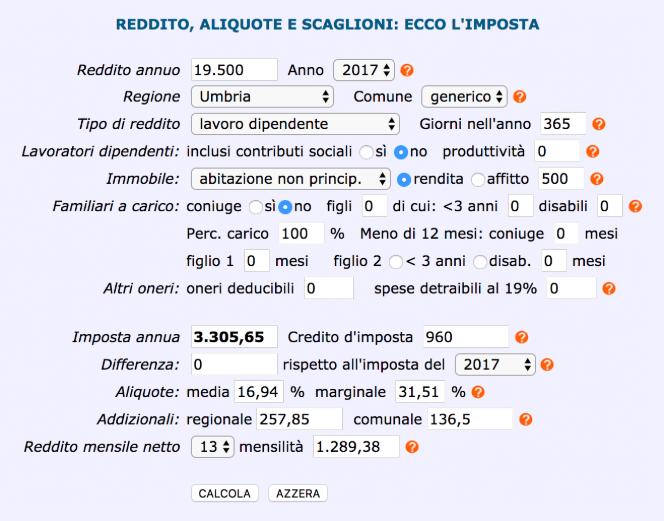
This is an example of calculating personal income tax for an Italian earning 1,500 € (117,000 rubles). If we assume that he owns an 80 m² apartment with a cadastral value of 500 € (39,000 RUR), the tax amount for the year will be 3,303.65 € (258,100 RUR).
The services of a tax specialist cost from 100 euros per year, but by contacting him, you will receive accurate taxes and learn about additional costs when renting and buying property in Italy.
In Italy there are taxes that are strange to us - for example, a television tax of 90 euros per year or a tax on a bank account balance of 34.20 euros per year (if the balance is more than 5,000 euros).
A study by CGIA Mestre showed that Italians pay more than 100 taxes. On average, each citizen contributes 8,300 € (650,000 rubles) per year to the budget. Locals often complain about high taxes and this is a sore subject for them.
How will the money be paid?
Funds for the “Income from Active Living” project have already been allocated. The total for 2021 is €488,510.49.
Each applicant can receive economic assistance in the amount of €24 thousand. This amount will be paid in three tranches of €8 thousand per year for 36 months.
The first payment of €8 thousand will be made after the applicant submits the following documentation:
- regulation of obligations signed by the beneficiary;
- certificate from the place of residence in the municipality chosen to start the business;
- a copy of the document confirming the availability of real estate intended for residence;
- a copy of the document confirming the availability of real estate intended for business activities (if different from a house);
- indication of bank details: IBAN and name of the banking institution where the current account is opened in the name of the beneficiary;
- providing your certified email address (PEC) to the company, which will be used by the regional administration for communication and transmission of all information.
The second and third tranches of benefits will be paid after the 12th and 24th months, respectively. To receive money, in addition to the above information, you will need to submit a detailed report on the implementation of the entrepreneurial initiative, as well as copies of contracts for the supply of basic utilities (gas, electricity, etc.) from a residential building and a building in which production activities are carried out.
Watch this video and be inspired by the views - both Molise and Abruzzo. Heartwarming...
Banks, accounts, loans and cards
The most reliable banks in Italy: Intesa Sanpaolo, Cassa Depositi e Prestiti, Unicredit Group, Banca Monte dei Paschi di Siena. They easily open accounts for people with a residence permit in Italy. If you do not have a residence permit, you may be refused to open an account in order to obtain an account number with bank details (IBAN).
The more favorable the rates at the bank, the less likely it is that a non-resident will open an account. Getting a loan or mortgage is even more difficult . Some banks with good tariffs consider Russian citizens to be “high-risk” clients and do not open accounts with IBAN and do not provide mortgage loans.
How to open accounts:
- The resident must present a valid residence permit, an identity document and an identification code (codice fiscale).
- A non-resident can open a special type of bank account: conto estero or conto internazionale. These accounts are more expensive to maintain, and the main currency of the account will be the currency of the non-resident’s country. To transfer money into euros, you need to pay a fee.
The service in Italian banks is higher than in Russia. In the same Unicredit Group, new clients are served not in a common room at the counter, as they do in Russia, but in a separate office one on one with the manager.
Loans
European banks practically do not provide loans (including mortgages) to non-residents, and even more so to citizens of the former CIS, immigrants from African countries or refugees. Because we are considered unreliable clients. We talked about this in detail in the article: Loan in Europe for residents and non-residents: documents, requirements, rates.
General conditions for loans in Italy
| Interest for non-residents | Interest for residents (permanent residence, EU) | Application review period | Loan terms | Minimum loan amount |
| 3.5 – 5.6% (mortgage), but not more than 60% of the property value | from 2% (mortgage) from 3% (consumer) | from 21 to 45 days | Up to 20 years | 150,000 euros |
Rates for foreigners are higher. When deciding whether to issue a loan or not and at what rate, banks look at:
- total “net” income per month (solvency);
- legality of the origin of money (NDFL-2 must be translated and notarized);
- punctuality in repaying previous loans;
- availability of surety, real estate;
- a mortgage payment that should not exceed one-third of your monthly “net” income.
Before signing a contract and taking out a loan, you can find out the total annual interest rate (Tasso Annuo Effettivo Globale or T.A.E.G.). This show is calculated to take into account not only the interest rate, but also other costs of the loan (for example, taxes). The state charges a tax of 0.25% on consumer loans and 2% on mortgages.
Bank cards
In Italy there are three types of bank cards: “ATM”, “prepagata” and “carta di credito”:
- “ATM” – needed to withdraw cash from ATMs and pay for purchases in stores. She is not allowed to pay online, as online purchases are considered “dangerous” because the money is debited directly from the account. Some banks, such as Unicredit Group, issue an “ATM” card that can be used to pay everywhere. But many banks do not have a universal card, so Italians have at least two cards that they constantly use.
- "Prepagata" . Card for online purchases. It is not associated with an account, so online purchases are considered safer. You can transfer money to the card from your main card or top it up through an ATM. The bank does not insure the money on this card, so if it is stolen, there will be no compensation.
- “Card di credito” is a credit card that you can use to pay everywhere and then return the money to the bank with interest.
Cards are widely used in Italy and you can pay by card almost everywhere. But when buying for a small amount (up to 5 euros) in small shops, kiosks and cafes, you may be asked to pay in cash in order to avoid taxes that irritate Italians so much.
Immigration methods
Moving to Italy requires detailed study. It is necessary to decide on the appropriate method, since each of them imposes different requirements on applicants. The following methods of emigration to Italy from Russia are distinguished:
- employment;
- business;
- marriage;
- family reunion;
- political refuge.
How to move to Italy depends on individual circumstances. Some of the methods involve lower costs, others are associated with accelerated receipt of official status.
Official employment
Migration to Italy on the basis of employment involves an initial search for an employer. The company submits a request for permission to the migration department. Here a quota is formed for the maximum number of emigrants who can enter the country from non-EU countries.
After concluding an employment contract, you must contact the immigration department. Here a residence agreement is drawn up, which must contain:
- an obligation from the employer to pay travel expenses in the event of the employee’s deportation;
- guarantees to provide housing for a foreign employee.
Next, a residence permit is provided, which allows you to live and work in the country. It is important to live in the country most of the time so as not to lose your status.
Business emigration
How to move to Italy and create your own business? There are two possibilities here - organize your own enterprise or buy a ready-made one. It is allowed to operate as an individual entrepreneur or one of the founders of an Italian company. You can open your own business in the country without being a resident or citizen. Moving to start a business is one of the most optimal for people with average and high incomes.
Moving for Russians is attractive because it does not require large capital or the purchase of expensive real estate. There is also no mandatory requirement to hire local people as staff.
Migration to Italy from Russia for entrepreneurs is carried out according to the following scheme:
- Collection of documents. Personal documents and financial information are being prepared. Documents for moving family members are also provided.
- Submitting an application to the consulate. A detailed form is filled out and handed over to the employee along with the documents.
- Moving to Italy. If everything is in order with the documents, a visa is issued and you can move. If the move is carried out with family, financial support is provided for each additional adult and child. To do this, you can provide a bank statement of your account or deposit.
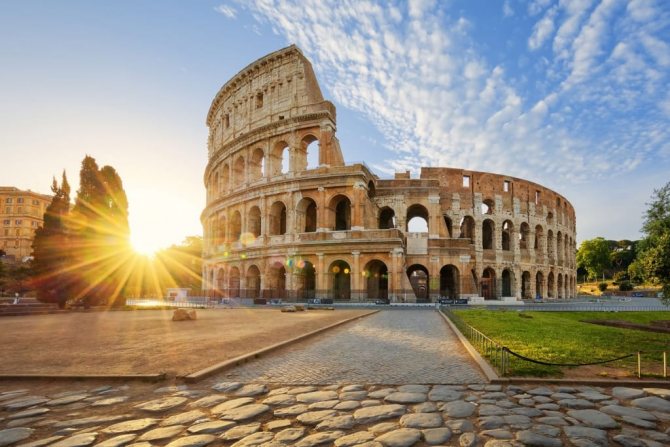
Marriage
Emigration to Italy through marriage is one of the simplest ways to move. Before marriage, you must obtain special permission. For this purpose the following documents are submitted:
- passport;
- international passport;
- birth certificate;
- statement of marital status, certified by a notary.
If the marriage has already been concluded, a tank certificate is provided. After submitting the documents, permanent residence is granted. A preliminary residence permit is not required.
Family reunion
How to move to Italy for permanent residence to reunite with your family? This method is suitable for those who have family members living in Italy. These can be both citizens and foreigners who live in the country legally.
The following persons can apply for this program:
- spouse;
- minor children;
- children over 21 years of age if they are dependent on their parents;
- dependent parents who have no other children at home;
- parents over 65 years of age if they have other children at home, but they cannot support them for health reasons.
When applying for a residence permit, you must provide documents confirming family ties and financial status. The host party provides accommodation. At the same time, a resident of Italy is required to stay in the country for at least 1 year.
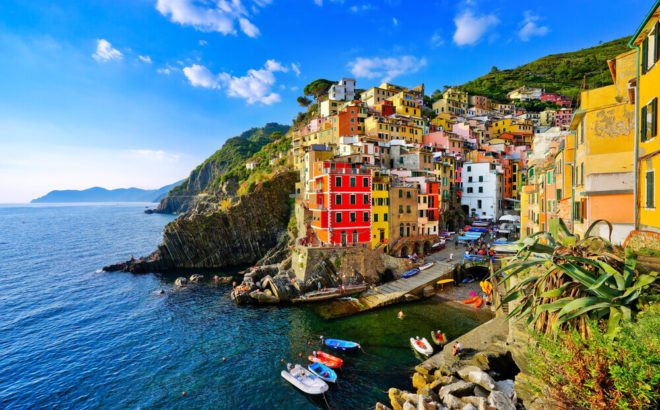
Refugee
Immigration to Italy from Russia is possible on the basis of political asylum. The applicant must prove that he is being persecuted in his home country because of his political opinions or his race.
This is one of the most difficult methods for Russians, since they need to prove the oppression with documents. Additionally, an interview is conducted at which government officials will verify the accuracy of the information provided. Upon receipt of asylum, permanent residence is granted for 5 years. If you live legally and there are no claims from government authorities, you can apply for citizenship.
Where to start preparing for immigration to Italy
Moving to Italy is more difficult than to Bulgaria, Portugal, Spain and Cyprus. After all, many issues have their “BUTs” that you need to know in order to gain a foothold in the country and receive the coveted permanent residence permit in 5 years.
You should start preparing for moving to Italy by choosing a region and city . Italy is a peninsula and two islands with 20 regions that differ from each other in prices, speed and standard of living.
Next, decide which method of obtaining a residence permit is most preferable for you and how much money you have. There are many migrants, so finding a job without specialized skills in Italy is difficult.
Advantages and disadvantages of living in Italy
As with moving to other countries, there are pros and cons of moving to Italy. Among the positive aspects are:
medical care at a high level;
- mild climate;
- high quality of life;
- guaranteed pension provision for Italian citizens;
- relatively low prices;
- high wages for qualified employees;
- the average wage is 1300-2500 euros;
- the possibility of movement and legal life in the countries of the European Union;
- creating favorable conditions for entrepreneurs and investors.
When planning to move to Italy for permanent residence from Russia, it is important to take into account high taxes. And to communicate freely, you will have to learn Italian, since most local residents speak only Italian.





